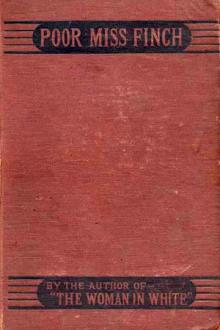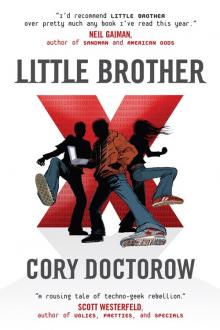Poor Miss Finch by Wilkie Collins (feel good novels txt) 📕

- Author: Wilkie Collins
- Performer: -
Book online «Poor Miss Finch by Wilkie Collins (feel good novels txt) 📕». Author Wilkie Collins
“Come!” he said. “I will see you as far as the rectory gate.
“You can’t go tonight,” I answered. “The last train has left hours since.”
“I can! I can walk to Brighton, and get a bed there, and leave for London tomorrow morning. Nothing will induce me to pass another night at Browndown. Stop! One question before I put the lamp out.”
“What is it?”
“Did you do anything towards tracing Oscar, when you were in London to-day?”
“I went to a lawyer, and made what arrangements with him I could.”
“Here is my pocket-book. Write me down his name and address.”
I wrote them. He extinguished the lamp, and led me into the passage. The servant was standing there bewildered. “Good night, James. I am going to bring your master back to Browndown.” With that explanation, he took up his hat and stick, and gave me his arm. The moment after, we were out in the dark valley, on our way to the village.
On the walk back to the rectory, he talked with a feverish volubility and excitement. Avoiding the slightest reference to the subject discussed at our strange and stormy interview, he returned, with tenfold confidence in himself, to his old boastful assertion of the great things he was going to do as a painter. The mission which called him to reconcile Humanity with Nature; the superb scale on which he proposed to interpret sympathetic scenery for the benefit of suffering mankind; the prime necessity of understanding him, not as a mere painter, but as Grand Consoler in Art—I had it all over again, by way of satisfying my mind as to his prospects and occupations in his future life. It was only when we stopped at the rectory-gate that he referred to what had passed between us—and even then, he only touched on the subject in the briefest possible way.
“Well?” he said. “Have I won back your old regard for me? Do you believe there is a fine side to be found in the nature of Nugent Dubourg? Man is a compound animal. You are a woman in ten thousand. Give me a kiss.”
He kissed me, foreign fashion, on both cheeks.
“Now for Oscar!” he shouted cheerfully. He waved his hat, and disappeared in the darkness. I stood at the gate till the last rapid pit-pat of his feet died away in the silence of the night.
An indescribable depression seized on my spirits. I began to doubt him again, the instant I was alone.
“Is there a time coming,” I asked myself, “when all that I have done tonight must be done over again?”
I opened the rectory-gate. Mr. Finch intercepted me before I could get round to our side of the house. He held up before me, in solemn triumph, a manuscript of many pages.
“My Letter,” he said. “A Letter of Christian remonstrance, to Nugent Dubourg.”
“Nugent Dubourg has left Dimchurch.”
With that reply, I told the rector in as few words as possible how my visit to Browndown had ended.
Mr. Finch looked at his letter. All those pages of eloquence written for nothing? No! In the nature of things, that could not possibly be. “You have done very well, Madame Pratolungo,” he remarked, in his most patronizing manner. “Very well indeed, all things considered. But, I don’t think I shall act wisely if I destroy this.” He carefully locked up his manuscript, and turned to me again with a mysterious smile. “I venture to think,” said Mr. Finch with mock humility, “My Letter will be wanted. Don’t let me discourage you about Nugent Dubourg. Only let me say:—Is he to be trusted?”
It was said by a fool: it would never have been said at all, if he had not written his wonderful letter. Still, it echoed, with a painful fidelity, the misgiving secretly present at that moment in my own mind—and, more yet, it echoed the misgiving in Nugent’s mind, the doubt of himself which his own lips had confessed to me in so many words. I wished the rector good night, and went upstairs.
Lucilla was in bed and asleep, when I softly opened her door.
After looking for awhile at her lovely peaceful face, I was obliged to turn away. It was time I left the bedside, when the sight of her only made my spirits sink lower and lower. As I cast my last look at her before I closed the door, Mr. Finch’s ominous question forced itself on me again. In spite of myself, I said to myself—
“Is he to be trusted?”
WITH the new morning, certain reflections found their way into my mind which were not of the most welcome sort. There was one serious element of embarrassment in my position towards Lucilla, which had not discovered itself to me when Nugent and I parted at the rectory gate.
Browndown was now empty. In the absence of both the brothers, what was I to say to Lucilla when the false Oscar failed to pay her his promised visit that day?
In what a labyrinth of lies had the first fatal suppression of the truth involved us all! One deception after another had been forced on us; one disaster after another had followed retributively as the result—and, now that I was left to deal single-handed with the hard necessities of our position, no choice seemed left to me but to go on deceiving Lucilla still! I was weary of it and ashamed of it. At breakfast-time, I evaded all further discussion of the subject, after I had first ascertained that Lucilla did not expect her visitor before the afternoon. For some time after breakfast, I kept her at the piano. When she wearied of music, and began to talk of Oscar once more, I put on my hat, and set forth on a domestic errand (of the kind usually entrusted to Zillah), solely for the purpose of keeping out of the way, and putting off to the last moment the hateful necessity of telling more lies. The weather stood my friend. It threatened to rain; and Lucilla, on that account, refrained from proposing to accompany me.
My errand took me to a farm-house on the road which led to Brighton. After settling my business, I prolonged my walk, though the rain was already beginning to fall. I had nothing on me that would spoil; and, in my present frame of mind, a wet gown was a preferable alternative to returning to the rectory.
After I had walked about a mile further on, the solitude of the road was enlivened by the appearance of an open carriage approaching me from the direction of Brighton. The hood was up to protect the person inside from the rain. The person looked out as I passed, and stopped the carriage in a voice which I instantly recognized as the voice of Grosse. Our gallant oculist insisted (in the state of the weather) on my instantly taking shelter by his side and returning with him to the house.
“This is an unexpected pleasure,” I said. “I thought you had arranged not to see Lucilla again till the end of the week.”
Grosse’s eyes glared at me through his spectacles with a dignity and gravity worthy of Mr. Finch himself.
“Shall I tell you something?” he said. “You see sitting at your side a lost surgeon-optic. I shall die soon. Put on my tombs, if you please, The malady which killed this German mans was—Lofely Feench. When I am away from her—gif me your sympathies: I so much want it—I sweat with anxiousness for young Miss. Your damn-mess-fix about those two brodders is a sort of perpetual blisters on my mind. Instead of snoring peaceably all night in my nice big English beds, I roll wide awake on my pillows, fidgeting for Feench. I am here to-day before my time. For what? For to try her eyes—you think? Goot Madam, you think wrong! It is not her eyes which troubles me. Her eyes will do. It is You—and the odders at your rectory-place. You make me nervous-anxious about my patients. I am afraid some of you will let the mess-fix of those brodder-twins find its way to her pretty ears, and turn her poor little mind topsy-turvies when I am not near to see to it in time. Will you let her be comfortable-easy for two months more? Ach Gott! if I could only be certain-sure of that, I might leave those weak new eyes of hers to cure themselves, and go my ways back to London again.”
I had intended to remonstrate with him pretty sharply for taking Lucilla to Browndown. After what he had now said, it was useless to attempt anything of that sort—and doubly useless to hope that he would let me extricate myself from my difficulties by letting me tell her the truth.
“Of course you are the best judge,” I said. “But you little know what these precautions of yours cost the unfortunate people who are left to carry them out.”
He took me up sharply at those words.
“You shall judge for yourself,” he said, “if it is not worth the cost. If her eyes satisfy me—Feench shall learn to see to-day. You shall stand by, you obstinate womans, and judge if it is goot to add shock and agitation to the exhaustions and irritabilities and bedevilments of all sorts which our poor Miss must suffer in learning to see, after being blind for all her life. No more of it now, till we get to the rectory-place.” By way of changing the subject for the present, he put a question to me which I felt it necessary to answer with some caution. “How is my nice boys?—my bright-clever Nugent?” he asked.
“Very well.”
There I stopped, not feeling at all sure of the ground I was treading on.
“Mind this!” Grosse went on. “My bright-boy-Nugent keeps her comfortable-easy. My bright-boy-Nugent is worth all the rest of you togedder. I insist on his making his visits to young Miss at the rectory-place, in spite of that windy-talky-puff-bag-Feench-father of hers. I say positively—Nugent shall come into the house.”
There was no help for it now. I was obliged to tell him that Nugent had left Browndown, and that I was the person who had sent him away.
For a moment, I was really in doubt whether the skilled hand of the great surgeon would not be ignobly employed in boxing my ears. No perversion of spelling can possibly report the complicated German-English jargon in which his fury poured itself out on my devoted head. Let it be enough to say that he declared Nugent’s abominable personation of his brother to be vitally important—so long as Oscar was absent—to his successful treatment of the sensitive and excitable patient whom we had placed under his care. I vainly assured him that Nugent’s object in leaving Dimchurch was to set matters right again by bringing his brother back. Grosse flatly declined to allow himself to be influenced by any speculative consideration of that sort. He said (and swore) that my meddling had raised a serious obstacle in his way, and that nothing but his own tender regard for Lucilla prevented him from “turning the coachmans back,” and leaving us henceforth to shift for ourselves.
When we reached the rectory gate, he had cooled a little. As we crossed the garden, he reminded me that I stood pledged to be present when the bandage was taken off.
“Now mind!” he said. “You are going to see, if it is goot or bad to tell her that she has had those nice white arms of hers round the wrong





Comments (0)